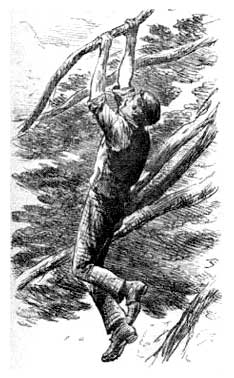Chapter 3 | A Life's Eclipse
“How do you say it happened?”
Old Tummus was riding in the doctor’s gig back to The Hollows after running across to the village for help; and he now repeated all he knew, with the additions of sundry remarks about these new-fangled young “harticult’ral gardeners who know’d everything but their work.”

“Come right down on his head, poor lad,” he said; “but you’ll do your best for him, doctor: don’t you let him slip through your fingers.”
The doctor smiled grimly, and soon after drew up at the door in the garden wall, and hurried through to the bothy where John Grange had been carried and lay perfectly insensible, with Mrs Mostyn, a dignified elderly widow lady, who had hurried out as soon as she had heard of the accident, bathing his head, and who now anxiously waited till the doctor’s examination was at an end.
“Well, doctor,” said Mrs Mostyn eagerly, “don’t keep me in suspense.”
“I must,” he replied gravely. “It will be some time before I can say anything definite. I feared fractured skull, but there are no bones broken.”
“Thank heaven!” said Mrs Mostyn piously. “Such a frank, promising young man—such an admirable florist. Then he is not going to be very bad?”
“I cannot tell yet. He is perfectly insensible, and in all probability he will suffer from the concussion to the brain, and spinal injury be the result.”
“Oh, doctor, I would have given anything sooner than this terrible accident should have occurred. Pray forgive me—would you like assistance?”
“Yes: of a good nurse. If complications arise, I will suggest the sending for some eminent man.”
Many hours elapsed before John Grange opened his eyes from what seemed to be a deep sleep; and then he only muttered incoherently, and old Tummus’s plump, elderly wife, who was famed in the district for her nursing qualities, sat by the bedside and shed tears as she held his hand.
“Such a bonny lad,” she said, “I wonder what Miss Mary’ll say if he should die.”
Mary had heard the news at breakfast-time before her father had returned, but she made no sign, only looked very pale and grave. And as she dwelt upon the news she wondered what she would have said if John Grange had come to her and spoken as Daniel Barnett did on the previous evening.
This thought made the colour come back to her cheeks and a strange fluttering to her breast as she recalled the different times they had met, and John Grange’s tenderly respectful way towards her.
Then she chased away her thoughts, for her mother announced from the window that “father” was coming.
A minute later James Ellis entered, to sit down sadly to his breakfast, his silence being respected by mother and daughter.
At last he spoke.
“You heard, of course, about poor Grange?”
“Yes. How is he?”
“Bad—very bad. Doctor don’t say much, but it’s a serious case, I fear. Come right down on his head, close to my feet. There—I can’t eat. Only fancy, mother, talking to me as he was last night, and now lying almost at the point of death.”
He pushed away cup and plate, and sat back in his chair.
“‘In the midst of life we are in death,’” he muttered. “Dear, dear, I wish I hadn’t spoken so harshly to him last night, mother. Fine, straightforward young fellow, and as good a gardener as ever stepped.”
Mrs Ellis sighed and glanced at her daughter, who was looking wildly from one to the other.
“There; I’ll get back. Ah! Who’s this?”
It was Daniel Barnett, who had run up from the bothy; and Ellis hurried out to the door.
“What is it?” he cried anxiously.
“Old Hannah says, ‘Will you come on:’ She don’t like the looks of him. He’s off his head.”
Ellis caught his hat from the peg, and glanced at Daniel Barnett with a peculiar thought or two in his head as the young man looked quickly at the door and window.
Barnett caught the glance and felt uncomfortable, for though sorry for his fellow-worker’s accident, certain thoughts would intrude relating to his own prospects if John Grange were not at The Hollows.
They hurried down to the grounds, mother and daughter watching from the window, and in those few minutes a great change came over Mary Ellis’s face. It was as if it rapidly altered from that of the happy, careless girl, who went singing about the house, to the thoughtful, anxious woman. Even her way of speaking was different, as she turned quickly upon her mother.
“What was father so angry about last night?” she said. “Did he have a quarrel with poor Mr Grange?”
“Well, hardly a quarrel, my dear. Oh, it was nothing.”
“But he said he was sorry he spoke so harshly to him. Mother, you are keeping something back.”
“Well, well, well, my darling, nothing much; only young men will be young men; and father was put out by his vanity and conceit. He actually got talking to father about you.”
“About me?” said Mary, flushing, and beginning to tremble.
“Yes, my dear; and, as father said, it was nothing short of impudence for a young man in his position to think about you. I don’t know what’s come to the young men now-a-days, I’m sure.”
Mary said nothing, but she was very thoughtful all that day, and during the days which followed, for she had found out the truth about herself, and a little germ that had been growing in her breast, but of which she had thought little till Daniel Barnett came up and spoke, and made her know she had a heart—a fact of which she became perfectly sure, when the news reached her next morning of the sad accident in the grounds.

